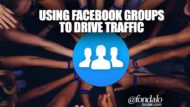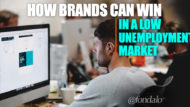Whether it be digital marketing, tangible products and online services, experiences are continually occurring around your business. Customers experience your actual products, yet they also experience your continued messaging and most importantly how you handle them with customer service after the sale.
But is that where customer experiences begin and end? Better think again.
Well ahead of customer purchase journeys and life cycles, your prospects are experiencing your brand through the various elements of your digital marketing efforts. What’s more, they are also being bombarded with experiences from others within your market that are startups or old players making a new move within your space. This competition threatens to disrupt your current or future revenue, market share, and even your overall market perception.
If you are a new brand entering a market and attempting to take on big enterprise brands with new innovations that disrupt the marketplace, you too need to take a long hard look at the experiences your prospects and customers will have. From today and into the future.
Experiences Can Create Market Disruption
According to recent research by Accenture, 34% of CMO ‘s and CEO ‘s who were surveyed said that their customers were more open to engaging in offerings from new entrant competitors. What’s even more astounding is that 29% said that new entrants into their space were using customer experience as a key differentiator against them. 30% of those same executives said that these new entrant competitors are better at providing a positive customer experience than traditional players long within the market.
I am not sure that all of you got what was just outlined here. Beyond the features, benefits and value brands are offering through their actual products and services, nearly one-third of executives believe that new entrants and startups are or can use an improved customer experience as a main differentiator to create disruption the market!
Startups Should Be Differentiating Through Experiences
If you are a startup attempting to break into an established market with new and innovative products, services or technologies this should really be getting your attention. Your biggest brand competitors are struggling to remain relevant and provide required and expected experiences across the customer life cycle and they know it.
In another report, about 75% of global business leaders said that they are concerned that startups could pose a threat to their businesses, and feel that startups have a “tech advantage”.
Trust me when I tell you that as a startup you are much more capable of creating improved experiences for your target market than the larger players. You are nimble, agile and have far less bureaucracy in place than they do, not to mention your innovation mindset is likely well ahead of theirs as well. Using improved, advanced and innovative experiences for your customers and prospects should have as much focus as that you are placing on your product development.
Opportunities For Disrupting Experiences
97% of CEO and CMO respondents in the Accenture research said that they are placing an emphasis on protecting their businesses from new competitors that have not traditionally been a part of their industry. That goes for startups as well as existing brands making a new play into their space. In fact, 43% of CMO’s said that safeguarding against competition is a large priority, while 54% said it was only so to some extent.
This shows that the opportunities within market disruption are real and go both ways. Both for startups and potential for existing businesses that recognize the potential disruptions and take clear, innovative steps to guard against disruption by new entrants.
So if new and improved experiences are seen as such a threat to existing market leaders and customers are apparently pretty open to better experiences, where are the opportunities?
Marketing Experiences
This phrase “Marketing Experiences” can mean two distinctly different things and I meant it to. You can and should be marketing the kind of experiences your new and existing customers want and expect, so that is pretty clear. But the other meaning is less obvious.
Marketing experiences are an actual thing in and of itself. Marketing experiences are consciously designed and created content, funnels and messaging that result in an intended feeling or experience. In the marketing sense, experiences are about creating content that take your customer from an initial discovery of your brand or product, all the way through multiple types of carefully created content. Each component of the experience is designed to touch on emotional connections that address needs, wants and challenges that your customer has.
Are you just marketing experiences as a differentiation to your prospective customers, or are you also creating marketing experiences through high-end content marketing that evoke emotions and drive desired actions?
If you’d like to discuss marketing experiences that will disrupt your industry for your brand, click here.








Trackbacks/Pingbacks